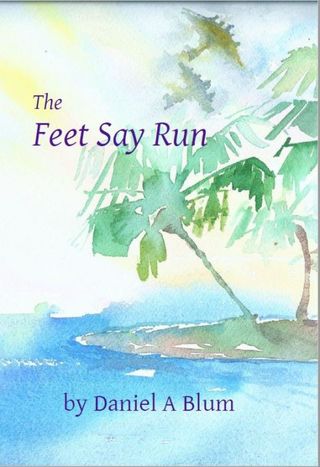Fantasies
The Challenge of Writing and Publishing Dark Fiction
Learn from Daniel A. Blum how and why he wrote his amazing second novel.
Posted February 6, 2017

You can probably guess it's not easy to write a novel that reflects intelligently on good, evil, love, cowardice, Nazis, and being stranded on a desert island.
It definitely was a challenge in many ways, agrees Daniel A. Blum, author of The Feet Say Run, whose first novel, Lisa33, was published by Viking 14 years ago.
In this interview, I began by asking Blum what took him so long to get his second book into the world, and why he chose this challenging topic.
Q&A with Daniel A. Blum
Q: Fourteen years came between your first and second novel. Can you explain where the time went?
Not entirely. A lot of years seem to have flown by awfully quickly. Very suspicious. Perhaps I should launch an investigation.
Seriously, my experience with my first novel, Lisa33, was quite dispiriting. I had a big advance from a prestigious publisher, was promised great things, and very little came of it. It was so demoralizing in fact that I stopped both writing and reading for a couple of years. I raised my children and worked full-time. When I got back into it, I wound up in the midst of a pretty ambitious project that took a few years to complete. And then we can tack on a couple of more years getting it published and somehow, I’m not sure exactly how, it all adds up.
Q: Can you say something about how you decided to write in the voice of a somewhat sympathetic German in World War II? Your protagonist was young, ignorant about Jewishness, and as fearful of coming to the negative attention of the Third Reich as most of us would be. Of course, he only managed to kill an enemy duck. If he'd been a more successful killer while he fought for the Nazis, it would be much harder for readers to see him as a vulnerable human, right?
I was raised with much the same view of Nazi Germany as most other Jewish Americans, and indeed most other Americans. In a way, the idea it was a society of mad, evil, killer robots is a reassuring one. It separates us from them. It offers a simple, rather pat explanation for what happened.
But the more I read and thought, the more I realized how wrong this view was. So Hans, my narrator in The Feet Say Run, is as complex as any human in any society. The fact of his extraordinary experience growing up in Nazi Germany gives him a worldview, a narrative voice, that is different, that could explore the world from a particularly interesting perspective—jaded and dark and comic and ironic, all at once.

Q: You write relationships superbly well. Are you just naturally psychologically astute and sensitive or do you work at it?
Thank you much. I could write a long essay in answer to this, and someday I would like to. The truth is, I grew up immersed in the world of psychology. My father is the well-known psychoanalyst Harold Blum, the former editor of the Journal of the American Psychoanalytic Society. My brother is also a practicing psychoanalyst. My sister and mother are both clinical psychologists. Although I avoided the family business, thinking about motives and psychology is definitely in my blood.
But there is still the challenge of how to translate psychological awareness into fiction that is seamless and not heavy-handed, that manages to probe into the minds of characters without appearing to do so. In previous generations there was a lot of mediocre art that tried to apply Freud’s ideas too overtly.
So I would say, growing up with that background helped me think in a certain way. What is a metaphor, after all, but a free association put into prose? The challenge becomes making the reader see it, sense some subconscious connection, by finding just the right words, without breaking up the flow of the story. I had to learn, at times, to let the reader just enjoy the story.
Q: I imagine your novel went through significant changes along the way to publication. At times I wondered if input from others helped you decide to change something. For instance, I appreciated the part near the end where you offered readers satisfaction, even though as I read it, I wondered how "real" it was. And to be able to go on from that section without angering or frustrating the reader, well, you handled that masterfully. Was that a part of your earliest drafts?
I had terrific help and advice from a number of readers, and you’re quite right that the ending especially received some important suggestions and insights. The challenge with the ending of this book was in finding the right mixture of tragedy and hope. Related to this was the challenge of finding the right mixture of realism and satisfying of expectations. So…it went through some variations. I’m a very big believer that readers want and deserve complete stories. With real, full-blooded plots. Even in “literary” fiction. So…I definitely push myself to deliver.
Q: I know The Feet Say Run just came out, but are you already working on or planning another book?
I have a couple of other things I’m working on—old projects that I am revisiting. But nothing definite yet and in a way I’m not in a great hurry. I also have a humor blog (another world from this novel) that I would like to turn into a book. But again—no hurry there. [See Blum's blog: https://RottingPost.com]
Q: Your book is so very good that I kept wondering why you went with a small publisher. I can only assume you ran out of other options? Because it's THAT good. (And small presses have little budget for promotion.)
I had a very big-shot agent for this book, Heide Lange, who is also Dan Brown’s agent. I had readers telling me it was one of their favorite books in years. And yet, Heide was unable to make a sale to a large publishing house. I still am kind of amazed—as was the publisher, Gabriel’s Horn, who’d picked it up.
I honestly will never really understand the judgments of editors at the big houses. I read so many literary novels that go on for a hundred pages and nothing happens and I give up on them. Whatever happened to plot? Story? Suspense? Are we now at the point where having a gripping story is considered a negative? I should probably be at least marginally diplomatic and leave it there.
Copyright (c) 2017 by Susan K. Perry, author of Kylie's Heel




